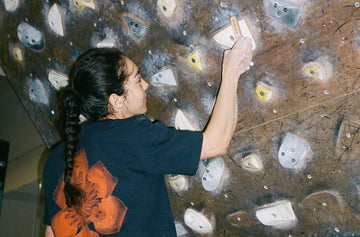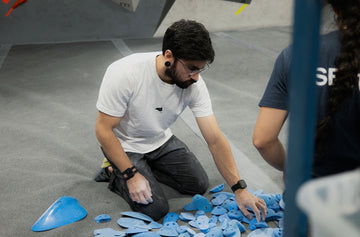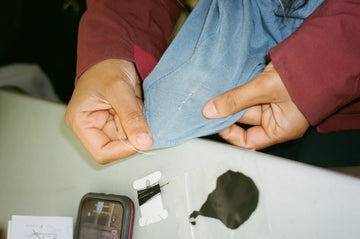Hi! My name is Jacquie. I am a 24-year-old climber, coach and routesetter born and raised in Toronto, Ontario (where I still live). My pronouns are she/her. I started climbing in 2014 as part of an after-school youth program and although I didn’t fully understand why, I always loved being at the climbing gym. It felt like a safe space for me; A second home. For a few years, I climbed very casually and didn’t even know that rockclimbing was considered a sport. When I started working at the gym in 2017, I made climbing friends who were passionate about climbing and pushing their limits, and this inspired me to follow suit.

Q&A
How have you managed to stay present and reduce performance anxiety? Where do you think or feel this pressure comes from (society, culture, experience competing, etc.)
In the beginning, climbing was my escape from the rest of the world. It would quiet my anxious mind and racing thoughts. Hours felt like minutes. I started getting stronger and was excited by my progression. Never before had I been “good” at something, as most of my life up until that point had been spent jumping from one phase to the next. But climbing felt right and I grew obsessed. I started to form an identity around climbing, and then subsequently began to tie my self-worth to my climbing ability. When I took a step back from climbing in 2021 to recover from an eating disorder and experienced regression for the first time, I felt completely lost. As if I had dissolved my identity as a climber and my friends in the community would no longer accept me.
This period taught me a lot. I learned that I was overly reliant on external validation and that I had stopped climbing for myself. I was chasing this impossible version of myself and it was damaging my self-esteem and health. Then I remembered why I fell in love with climbing: I love problem-solving, being surrounded by kind and passionate people, and moving my body.
Slowly but surely, I started to detach my self-worth from my climbing ability and climb for myself again. Today, I try to approach every climb with a beginner’s mindset; Let go of ego, comparison, expectations, and negative self-talk. Of course, this is much easier said than done. When you care about something so much, you will inevitably experience the whole spectrum of emotions. So don’t fight off the inevitable and accept that negative feelings are always going to show up and working on our mental game is a lifelong process.
Considering climbing is an extreme sport, how do you contend with the fact that there will always be a risk of injury? Did getting injured change your perspective on climbing and how you approach certain climbs/moves?
I broke my leg in July 2023. I couldn’t believe it happened and in a climbing gym of all places! I had never suffered an injury that took me away from climbing. The craziest thing was there was no pain when it happened. I only knew it was broken because of the loud crack I heard when I hit the ground, which was unlike anything I’d heard before. Soon enough, I found out I fractured my fibula and was going to be in a cast for at least 2 months.
Climbing is my life – I work at the gym and am surrounded by climbers all day long. Climbing is also the only way I get any social interaction! So recovering from the break was an isolating period. I was bound to my chair pretty much all day long and got pretty depressed. But I knew that in 6 months, this whole period would only be a blip in memory.
Once I was able to start walking on two feet again, I went to see a physiotherapist. He gave me a list of exercises to perform every day and I followed the routine religiously, never missing a day. I saw steady progress in the strength and mobility of my left leg/ankle. Finally, on September 12th, 2023, the physio told me I could start climbing again. I remember walking out of that appointment beaming. Everything in me felt good and whole.
I took my time with getting back into climbing and was very careful not to go too hard too soon. For a long time, I would get this mental block near the top of the wall. My fear took over and I couldn’t focus on climbing anymore. I wondered if this fear of falling would go away. Eventually, and with much time and practice, it did. I am still more risk-averse than I used to be, but that’s not necessarily a bad thing.
Yes, climbing is an extreme sport and there will always be a risk of injury involved, but there are ways we can minimize that risk. I take strength training seriously because being stronger makes us more resilient. I also actively practice risk assessment and make sure that I’m not doing anything stupidly dangerous. Since coming back to climbing after the fracture, I do a lot more practice falls if I feel scared to commit to a move; That way, if I end up falling in a risky position or high up on a climb, my body has learned the best way to fall.
You have shared about your experience of overcoming an eating disorder, known to be an isolating experience. What are things that your friends or family did that helped you?
It took a long time for me to admit I had a problem with food and my body. I remember going through the list of RED-S symptoms and realizing I was experiencing many of them: extreme fatigue, loss of period, sleep disturbance, trouble focusing, feeling cold all the time, digestive issues, and hair loss… I was in a bad place, but also felt torn. My climbing performance was improving and I was feeling more confident than ever. But my body was telling me loud and clear that it was not happy. I was tired of being in a constant battle with my own body.
I told my family that I was going to put on weight to try to regain my health. They were extremely supportive and helped me find a dietitian to help me through this process. It was an emotional time but I was grateful to have a strong support system that kept reminding me that I was on the right path. My dietitian told me to come up with a “why” and always keep that “why” at the forefront of my mind, especially during the low points. I had a few why’s but an important one was that I wanted to eat meals with my friends and family and focus on the company rather than the calories on my plate.
I could not have gone through this process without the support of my friends and family. For a long time, I hesitated to open up and reach out to others because I was embarrassed. Unfortunately, it took being underweight and my health being on a rapid decline to realize that I needed external support. There’s nothing to be embarrassed about and you don’t have to go through it alone. If I could go back, I would’ve asked for help years ago when I first started restricting my eating.
How have you managed to fuel your body lately? What has been the best habit or routine that has worked for your daily life?
I worked with a dietitian for around 6 months at the start of my recovery. In one of our first appointments, I asked her what I should eat. She answered that I was asking the wrong question and that instead, I should be asking myself: “What do I want to eat?”. This mental shift helped me get back in touch with my hunger cues. I spent years being afraid of hunger and thinking that getting hungry meant I lacked willpower. Now I understand that hunger is a natural part of being human. If I want to continue training at a high level and reach my goals as a climber, fueling my body must be a priority. Getting to this place was a process but I feel I have finally struck a good balance between eating for my health, performance and enjoyment.
Considering there is so much information about training and climbing… What are things to consider when following someone on social media or trusting their guidance? What are some red flags to consider?







